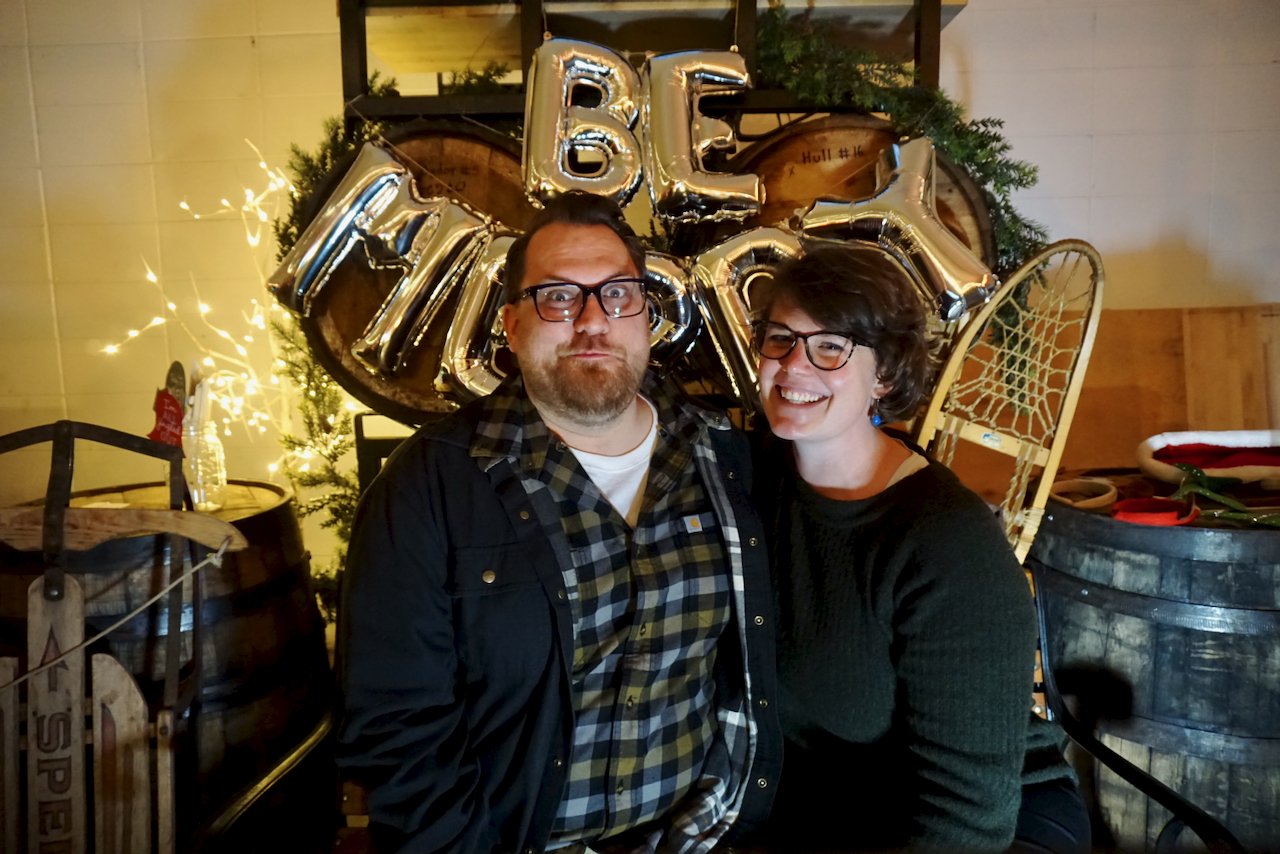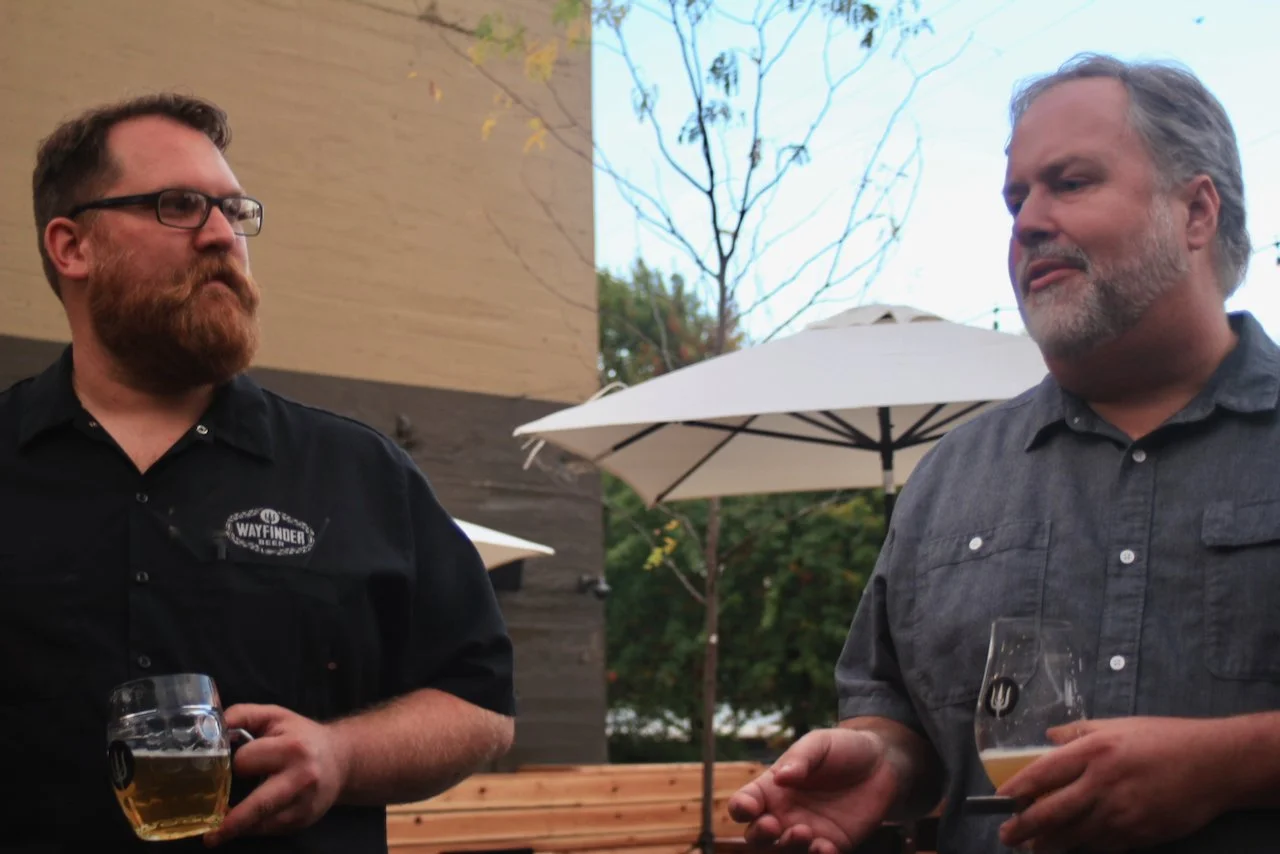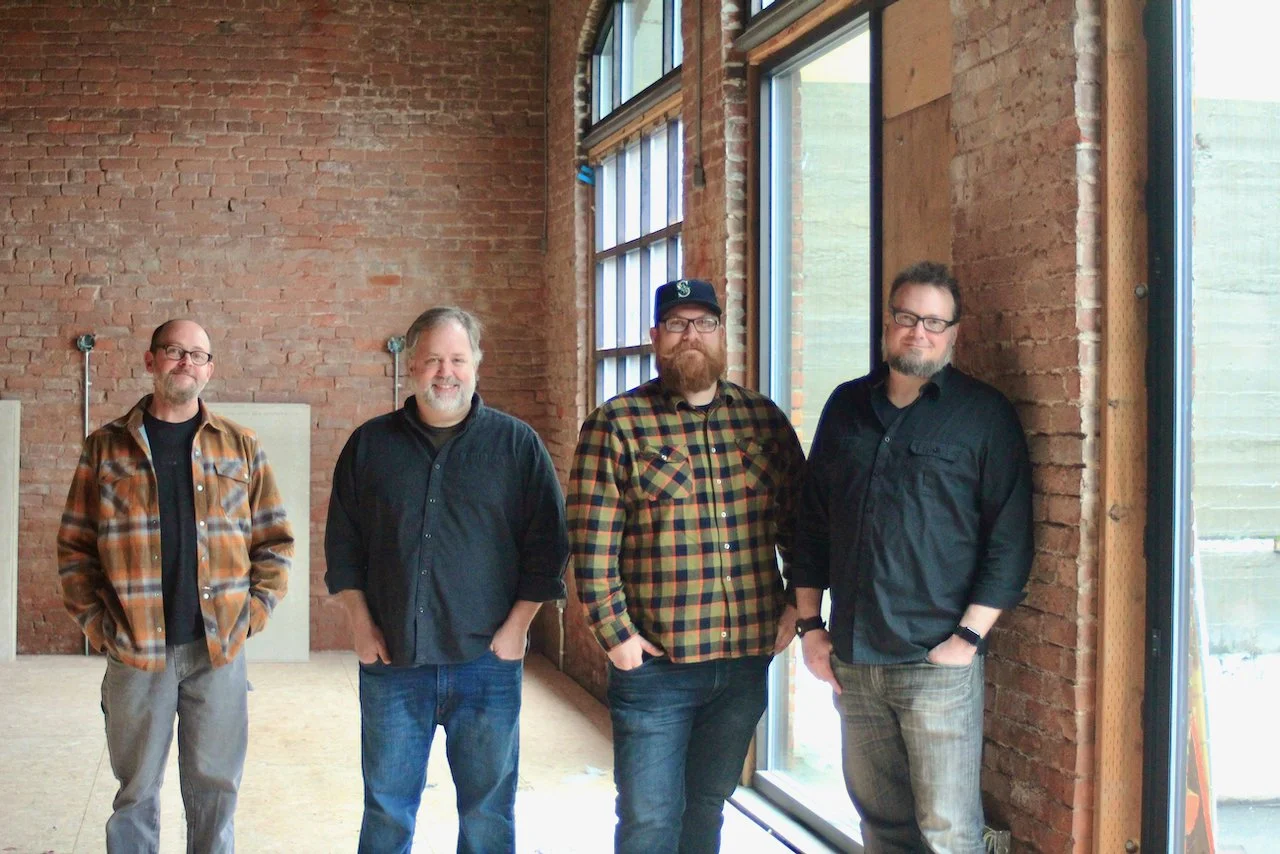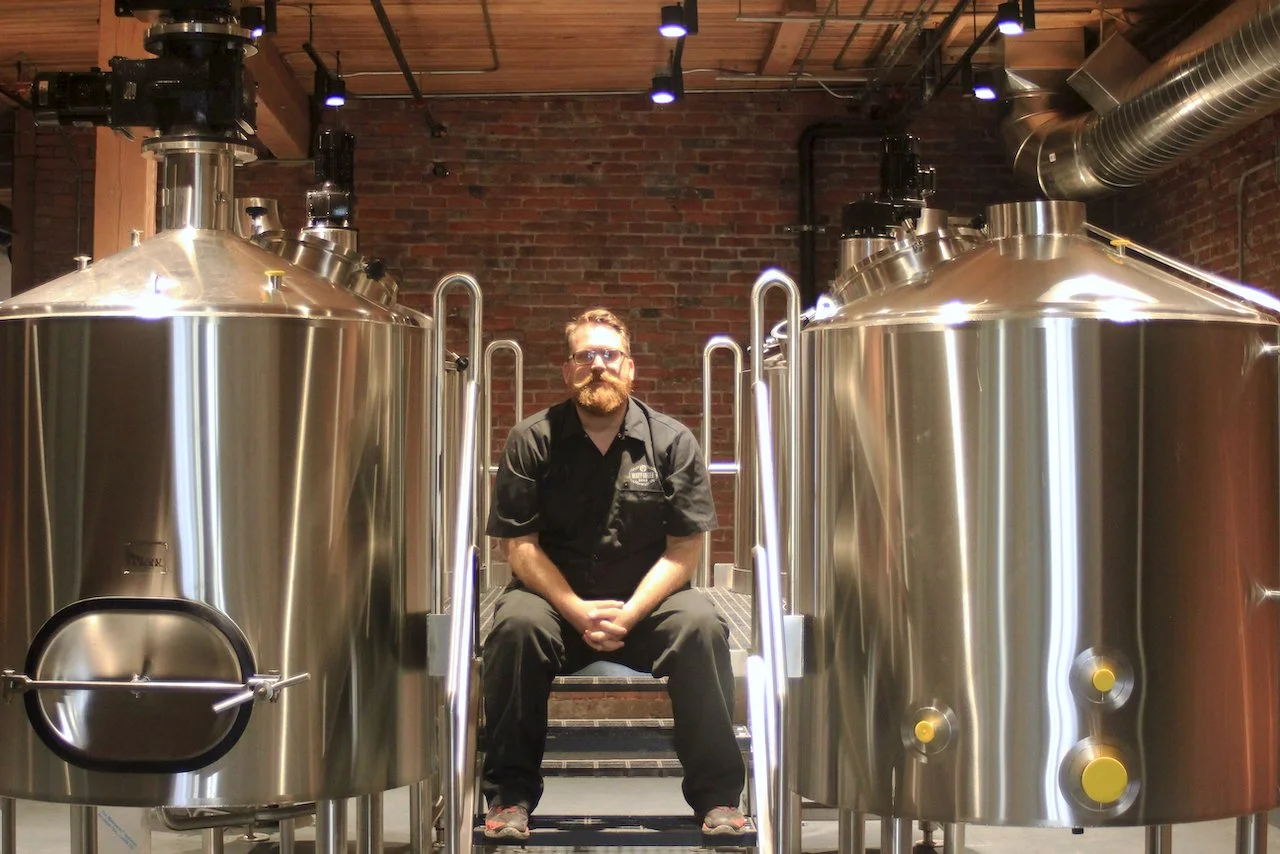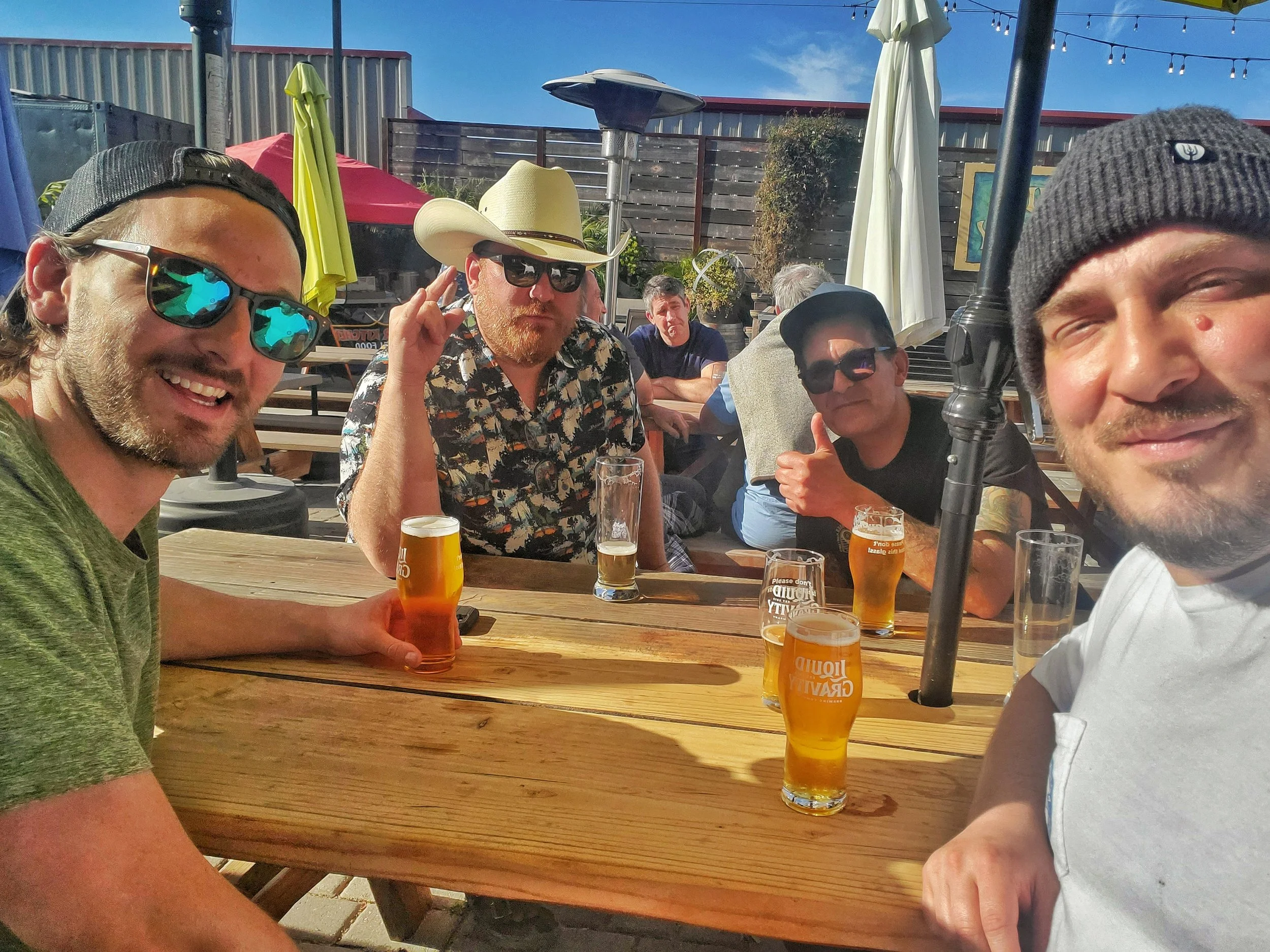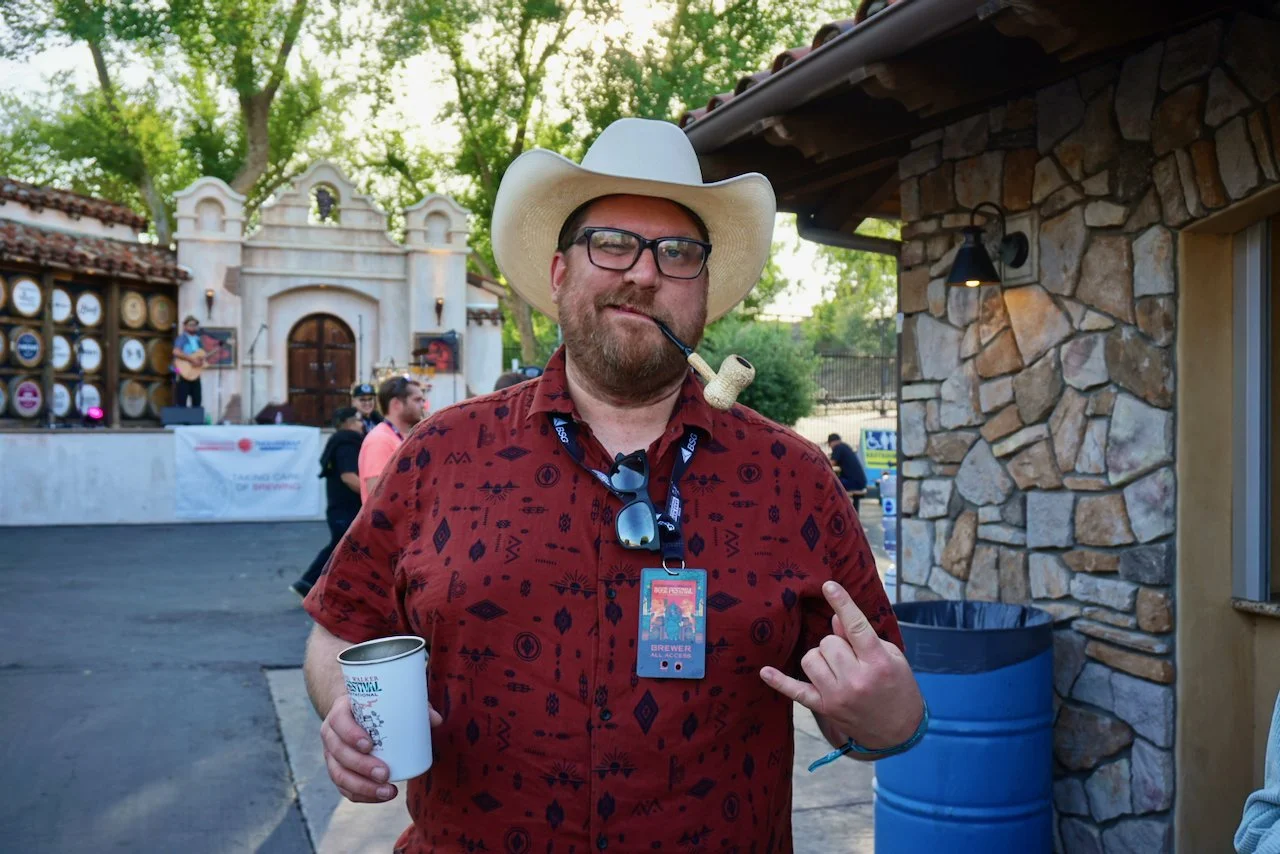Brewer Kevin Davey reflects on his career from Wayfinder to the upcoming Gold Dot Beer
From Plumber to Brewer; Wayfinder’s Kevin Davey on his new Gold Dot Beer
Kevin Davey and Lisa Allen of the upcoming Gold Dot Beer brand
Wayfinder Beer founding brewmaster Kevin Davey has announced plans to open Gold Dot Beer Co. with his partner Lisa Allen. The duo have taken over Heater Allen Brewing in McMinnville, Oregon which was founded by Lisa’s father Rick in 2007, and where she has been leading brewing operations for some time. Gold Dot Beer will exist as a standalone beer brand side-by-side with Heater Allen Brewing, and no big beer changes are planned for the latter. Accomplished brewer Natalie Baldwin is now leading the Wayfinder brewing team.
Most people know Kevin Davey as the brewmaster of Portland’s Wayfinder Beer, but he’s been a favorite of Washingtonians when he exceeded expectations as head brewer of Seattle’s Gordon-Biersch outpost in Pacific Place Mall from 2013-2015 when he first won a World Beer Cup medal. Before that he entered the professional brewing world at Chuckanut Brewery in 2010, and then went to Firestone Walker in 2012 before returning to Seattle.
Behind every splashy brewer entrance, there is a behind-the-scenes story and for Kevin Davey it started as a working plumber who homebrewed on the side, and is now opening a “luxury” lager brand brewing company.
This interview has been edited for clarity.
I know you worked as a plumber before brewing. Was that a job you liked, or thought that you would do for a life career?
Although I never thought of it as something I'd do forever, I loved the job. Cruising around Seattle in a truck, seeing every nook and cranny and really getting to know the city's underbelly, it was a job that really fit my lifestyle. Lot's of unsupervised time, having to make all the decisions yourself and having to deal with all the problems that came of them.
How did that skillset and lifestyle complement or contrast to brewing, and what was that adjustment like?
I didn't do much new construction. Mainly, I did service work and also a bit of remodeling. My job was to use logical reasoning to figure out the problem and to fix it. Say you had water coming out of a ceiling of the hallway of a 3rd floor apartment building that was built in the 20's. I had to solve the mystery. If there's anything that I miss completely from those times, it would be that. There's a lot of maintenance done in breweries but it's a different sort when you're also in charge of brewing the beer. It just is getting in the way instead of being the sole task at hand. It's just a pain in the ass. I do love taking apart the mystery of what makes a great beer. It involves a lot of history, science and mechanical and agricultural systems. There's also a bit of talent involved and frankly, luck. To be a great brewer you have to be good, or great, at a ton of different skills. In retrospect, I absolutely miss the freedom of roaming the city all day going from job to job. I felt so connected to Seattle in the 2000's in a way I never did with Portland, even though I grew up in its suburbs.
How did you get into homebrewing, and when did you first fall in love with lagers?
A friend of mine got married at 19, when I was 20. He got a homebrew kit as a wedding present and we made a stout. I drank them all. A couple of years later, I was living on my own and bought a whole setup. I caught the bug. A local bar had just opened up when I turned 21: the original Prost on Phinney Ridge. It was a total hangout for me where I drank heavily oxidized German lagers. It was pretty easy to get high quality IPAs, Pales, Stouts, etc. at other craft beer bars and brewpubs, so I mainly focused on homebrewing imported beer, which was a passion. Lagers were definitely the hardest beers to make and therefore what I gravitated towards. I like a good challenge I guess.
People in the industry know that you famously advocate for professional, classically-trained brewers. Where did that stance come from?
I'd hardly describe it as famously, but yes, I think there is a lot of value to taking the time to study brewing like you would any other job. It doesn't take the place of one-the-job training but certainly gives one a "leg up". Having a well-rounded understanding of technique and equipment and the like will, in some regard, give you a more complete understanding of the tools you use on the job. For example, if I study basic lauter tuns from the previous century, and further research how modern designs have adapted them over the years (like the Pegasus from Steinecker or Meura mash presses) then I can more completely understand how the lauter tun I'm using works and how I can manipulate it. Short answer is being a professional involves higher understanding. Siebel, Davis, ABG, etc are great resources for that.
I went to the World Brewing Academy (joint feature of Siebel and Doeman's) in the winter and spring of 2009. The course is in Chicago and Münich.
Kevin Davey and Charlie Devereux at Wayfinder’s opening in 2017
You first met Charlie Devereux [co-founder of Wayfinder Beer] when he was one of the owners of Double Mountain Brewery. I believe he was in Bellingham for a meet-the-brewer style event at the late beer bar/music venue The Green Frog.
It was probably 2010. He was having a brewer's night there and I made it a point to attend every brewer's night so I could meet industry folks. I was pretty green.
So it was about 7 years later that you heard through the grapevine he was starting a new lager-focused brewery and you just called him up?
It was when I was working at Gordon Biersch in Seattle. I would take my beers in growlers up to the Pine Box and talk beer with Ian [Roberts, owner of Pine Box]. He tipped me off that Charlie was opening a lager brewery. I called him up and told him I had to be the brewer.
Wayfinder Beer founders left to right: Rodney Muirhead, Charlie Devereux, Kevin Davey, Matt Jacobson
What attracted you to Wayfinder in the beginning?
At the time, I didn't know how to run a business at all. I didn't have any friends that worked in sales that wanted to do it with me. Frankly, I thought it would be way less stressful to just work for someone else. Charlie wanted to make a lager-centric brewery with lots of IPAs. Both are passions of mine.
What was the hardest part about getting Wayfinder and the brewery up and running? I remember there was that period when you were open but not brewing yet, what was that like? And then when you did get started brewing, did you feel like you immediately found your footing?
Opening Wayfinder took longer than any of us really thought it would. Building anything in the city of Portland can be excruciating. That's why you're seeing so many businesses that started in Portland, love Portland and want to grow in Portland, eventually move or open other locations outside of the city. I can speak for many peers of mine, we're liberal people who welcome regulation and taxation. We want our city to flourish and become more walkable, equitable, sustainable, etc. Problem is, the red tape has become figurative instead of pragmatic. And where resources have been neglected for addressing our problems, we end up getting either no action at all or complete forbiddence. I blame a lack of leadership and a streak of ineptitude.
Kevin Davey sits on a pre-operational Wayfinder brewdeck circa 2016
How have your tastes and preferences in beers and brewing styles changed just in your time at Wayfinder?
Not really. As I've gotten older I've become more narrow-minded and that's something I'm always working on changing. It hasn't helped that "Craft Beer" recently has become this weird three-headed beast: Seltzer, Fruited adjuncts, and the nonsensical trend of what I've referred to as our Dada moment: Pastry Stouts. It has more than solidified my love and my inevitable championing of classic styles.
What were the greatest challenges you faced at Wayfinder?
The pandemic, the pandemic and the pandemic.
What were the highlights, and I mean both beer-wise but also experiences, people, places, things or stories that you will always remember?
Oh my! So much to list I can't nearly include them all. Number one has to be all the brewers that I've worked with at Wayfinder. It has been an absolute pleasure to be along for the ride, and watch these fine individuals grow. Working with our art director Orion on new concepts: naming the beers and writing the descriptions, adding the Easter eggs on the can labels. Being on the forefront of some really cool beers that came out. All the collabs. Breakfasts at My Father's Place. Sitting by the firepit on the deck late at night with a CZAF while the Cocteau Twins are blasting and I'm scarfing a beer-cheese laden pretzel. Oregon Beer Award shenanigans. Stopping at 2 o'clock for tea and biscuits when we made British beers. The revolving door of brewers and beer people that would come in, especially during hop harvest. The four decoction Doppelbocks. The days when we would only play Coltrane or Bowie or Nick Cave. Making Terrifica, Golden Tiger, Relapse Cold IPA, No6, the fucking Pumpkin ALE! Did anyone see that coming?
What sort of lessons, or business choices, did you have or see at Wayfinder that were big takeaways on ways to do things or not to do things?
Wayfinder definitely taught me how to promote beer. How to make beer cool and approachable and fun. How to promote myself, too. As far as things not to do: forklift traffic should not go over wood floors. Can you briefly explain the forklift traffic incident? There is no incident at all. There's a section of floor at Wayfinder that a forklift must move over and it's made of wood. It has been wrecked over the years. I wish we could have chosen a different flooring.
You mentioned being a little emotional about leaving Wayfinder, why do you think that is? What will you miss the most?
I couldn't talk about this in the previous weeks mainly because I was still working at Wayfinder. Leaving Wayfinder has been a breakup of sorts. There are no negative feelings from either side, but it is still hard to say goodbye to something I've worked so hard at.
How did you first meet Lisa Allen?
Recently? Through the Oregon Brewers Guild meetings. But technically, in 7th grade at Hazelbrook Middle school. We didn't really know each other although we went to the same middle and high school.
Are you and Lisa’s brewing philosophies or processes different? How do they complement each other or contrast?
I think we complement each other grandly. Lisa is far more grounded and organized than I am. Coming from wine and making the switch to beer, her palate is way better. I've always considered myself a "lone-wolf" when it comes to brewing. I think it's important to empower the individual brewer to make sure they are realizing the most of their potential. Lisa is better at implementing systems and sticking to plans. She has a certain knack for plugging ingredients and practices together to make a new beer "pop" that never ceases to amaze me.
What made you decide it was time to leave Wayfinder, and was it a hard decision?
It was one of the hardest decisions of my life. When it comes down to it, I need to be my own boss to be happy. I kinda march to the beat of my own drummer and therefore I can be challenging to the most patient of employers. That being said, my goal is to make the best beer on the planet and be a pillar in my community. I want to make Gold Dot/Heater Allen to be not only a fun place to work at, but a safe and comfortable place, a place the locals think of when describing the town of McMinnville. I want to throw an amazing Christmas party.
So Rick Allen is retiring and you and Lisa are basically taking over for him at Heater Allen. Can you explain how that came about, and what Gold Dot Beer is?
Well, he's not really retiring. Rick is still staying on board part time because he loves spreadsheets, accounting, payroll and the like and frankly neither of us really want to do that. Lisa and I want to make space for him to enjoy his bike riding and trips to Europe. Stuff he couldn't do as much while running Heater Allen. That being said, Lisa has been in charge of running most of Heater Allen in recent memory so there won't be much of a change in that regard. Gold Dot beer and the Gold Dot Spot will be a joint feature of Lisa and I. Lisa will still be making Heater Allen beer as she has for the last 13 years. We don't want to change that at all. The Gold Dot beers will be our "luxury" brand. They will be unique beers that we work on together and really pour our heart and souls into it.
What is a "luxury" beer brand, can you explain? Does that mean $7 cans of Italian-style Pils?
Luxury lager beer doesn't mean $7 cans of Italian Pils. It means high quality beer. We'll be sourcing some really expensive raw ingredients and implementing what I can share later as we follow up "Gold Dot beers will be aged for 6 weeks post fermentation in horizontal lagering tanks and receiving traditional krausening. We want to implement our favorite practices of beer production to make a beer that should be head and shoulders above the rest. Lager lovers rejoice! We're getting super nerdy with it."
Where did you come up with the name Gold Dot Beer?
Somewhere between Kalama and Kelso on I5 while coming back from Bellingham. Lisa coined it actually.
Gold Dot is a brand of bullets, is that what you are referencing?
No it is not a reference to bullets. Don't overthink it.
You were recently quoted as saying Gold Dot Beer is a "beer-focused brewery,” and are going to be "making beer that really fucking matters." I can imagine what you might mean by that, but let's clarify if you can be specific?
In a time where it is getting harder to differentiate beer with spirits, wine and cocktails, Gold Dot beer will be beer for beer lovers. Do you like dry, crisp, refreshing and incredibly drinkable beer? Do you like beer that tastes like beer? That's aged extensively and matured to perfection? That's balanced and moreish and lovely? Gold Dot will be for you.
What will the Gold Dot Beer brand look like? Both as far as the look and feel, but also the genre of beers and brewing practices you plan to make?
I can share more on this later, but the Gold Dot beers will be aged for 6 weeks post fermentation in horizontal lagering tanks and receiving traditional krausening. We want to implement our favorite practices of beer production to make a beer that should be head and shoulders above the rest. Lager lovers rejoice! We're getting super nerdy with it.
How will Gold Dot Beer and Heater Allen Brewing co-operate and work with each other or is it completely walled off? Do you and Lisa co-own both Heater Allen and Gold Dot, or just the latter?
Both Lisa and I co-own Heater Allen and Gold Dot. It's all under the same roof.
The brewery and production are expanding right? Where is the extra space coming from, how large is it, what sorts of improvement and expansions will there be?
I can share more on this later, but basically Remy Wines moved out of the second half of the building. We took over the whole building, and we're turning the Remy space into a new cellar with area for finished product, canning line, and double the Fermentation and Lager space.
What kind of taproom will there be? Heater Allen has had this pretty tiny funky corner of the brewery and a little deck for a taproom. Will that change? Will it represent both Heater Allen and Gold Dot Beer side-by-side?
Since we're moving all cellar operations to the new space, it opens up the whole building where the taproom currently sits. We will be remodeling and adding lots of cool stuff. More on all this later, but yes, both under the same roof.
Left to right: August “Gus” Everson of the upcoming Recluse Brew Works, Kevin Davey, Wayfinder’s Orion Landau, and me
Between Gordon Biersch, Chuckanut and Wayfinder, you have worked at a lot of brewpubs. Do you like that social, dining, family friendly aspect? What are the pros and cons?
I am excited to work somewhere without a kitchen. I love the social aspect of brewpubs, but we're gearing the taproom to be more like a bar.
Does that mean you will be strictly 21+ ? And comparisons to a bar, suggest you would have spirits. Or are you thinking more of a beer tavern with bar nuts and a popcorn machine, vintage beer signs, maybe a jukebox and pool table sort of thing?
It will be more like the beer tavern you have described. Hot dogs, good tunes, couple of dead things on the wall, maybe a pool table. All ages. Children welcome, but this is an adult establishment.
Where are you out now in the build out, licensing, branding and reopening the taproom and launching your first beer? What will your first beer be?
We have a big hole in the floor in the old winery space. Tanks are on order and I'll be doing some construction while Lisa runs the brewery in the time being. I'll let you know when we launch our first beer! It'll be Luxurious!


